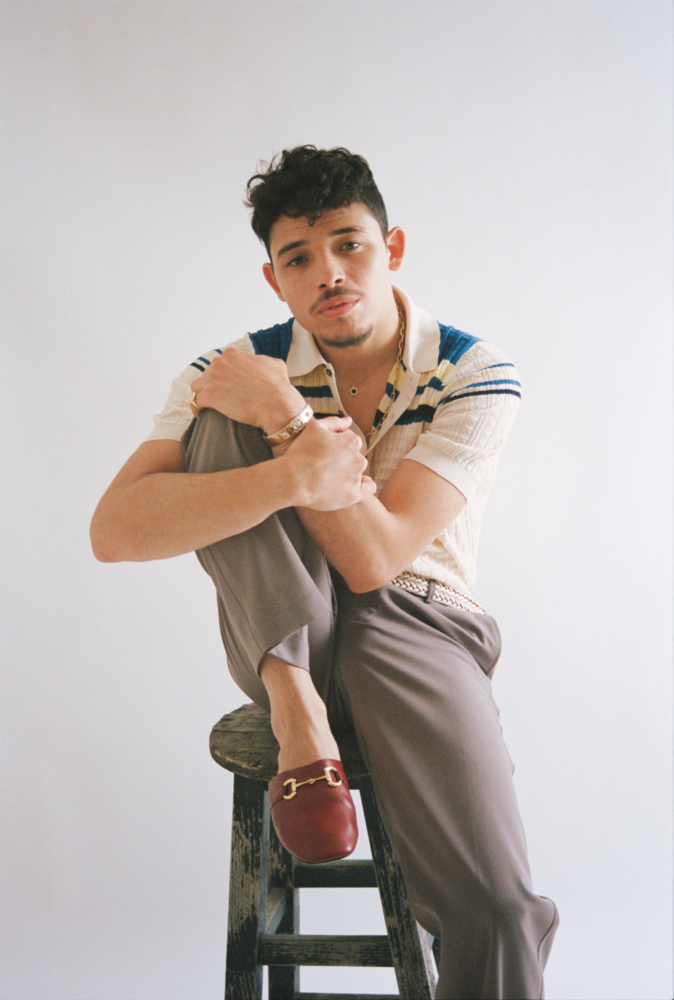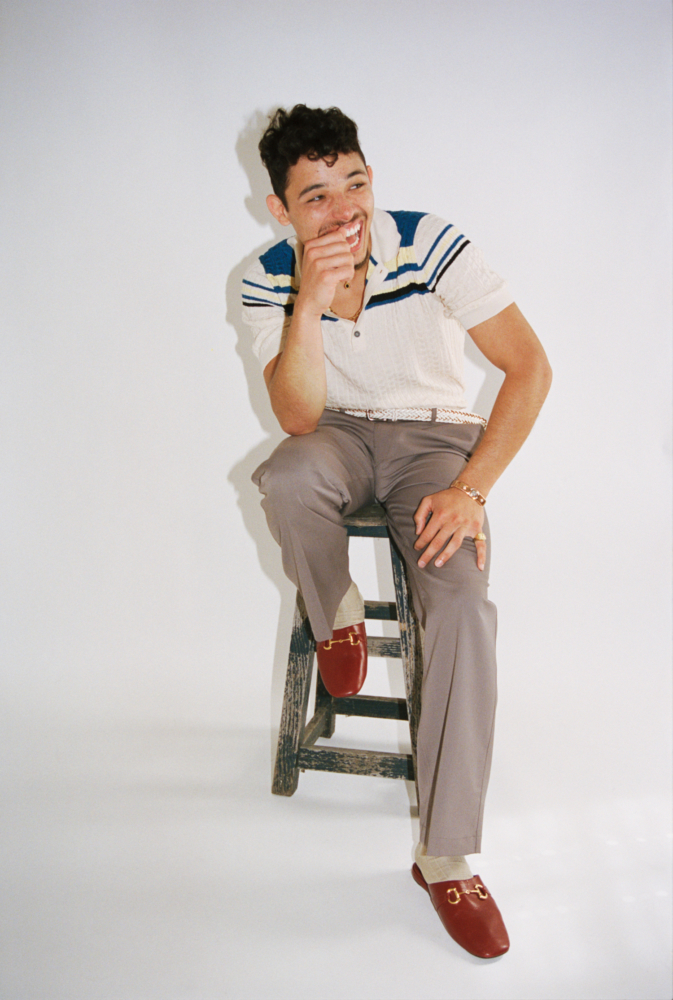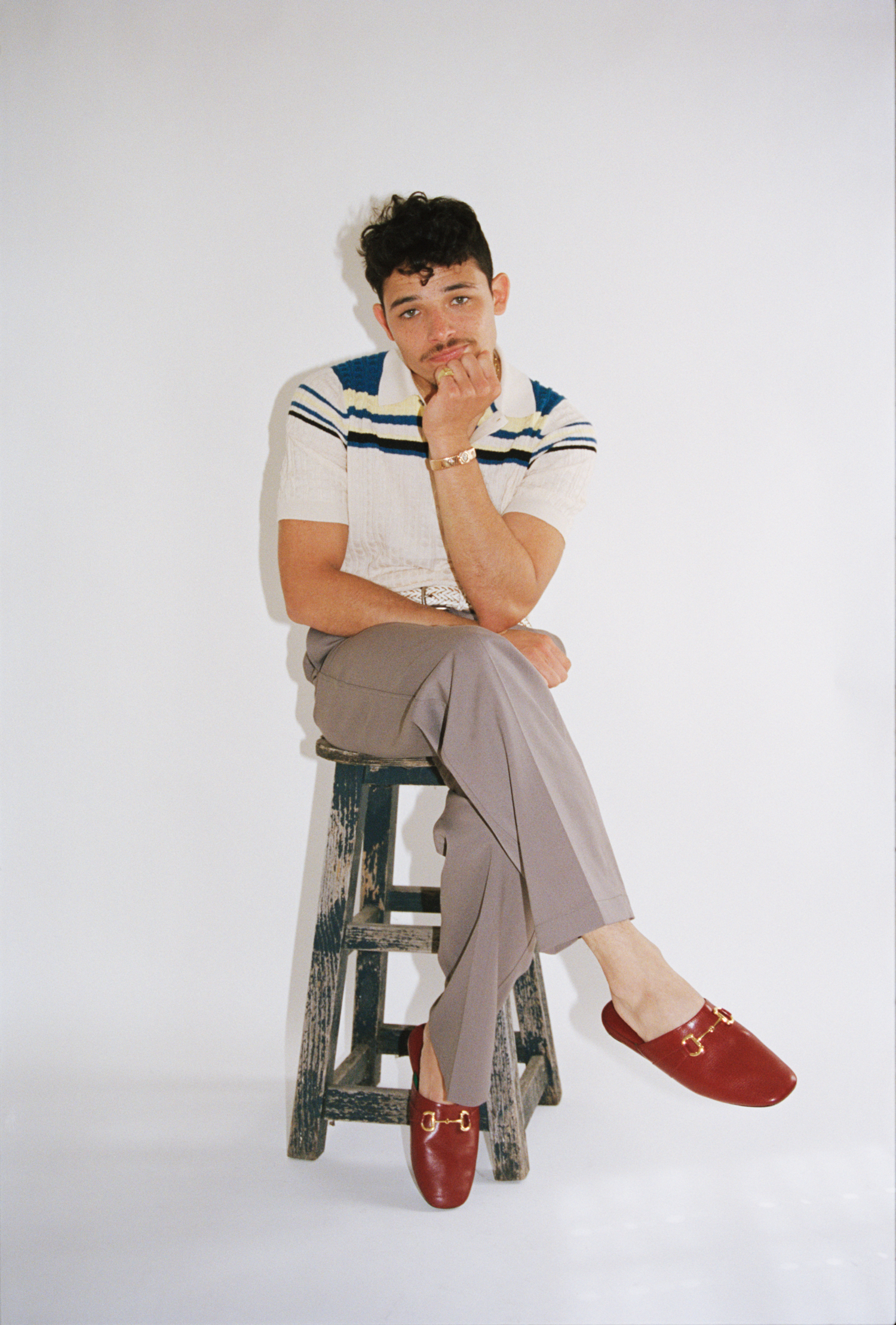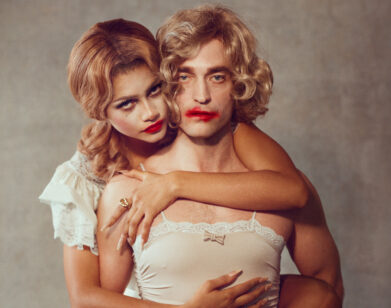a star is born
Anthony Ramos and Bradley Cooper on the Fallacy of Stardom

Shirt (worn throughout) by Salvatore Ferragamo. Pants (worn throughout) by LeMaire. Necklaces (top to bottom, worn throughout) by Bvlgari and Santos de Cartier. Bracelet and Ring (worn throughout) by Bvlgari. Shoes (worn throughout) by Gucci. Belt (worn throughout) from Ronald Burton Studio.
Earlier this year, at the 92nd Academy Awards, Lin-Manuel Miranda made a prediction: “That man is going to be a movie star.” Miranda was referring to Anthony Ramos, the young actor who had just introduced him to the stage. Miranda would know. In 2014, when Ramos was stringing together theater odd jobs just to stay afloat, Miranda cast him in the off-Broadway debut of his new musical Hamilton. Ramos, a graduate of the American Musical and Dramatic Academy in Manhattan, electrified in the dual roles of John Laurens and Philip Hamilton. By the time he left the Pulitzer Prize-winning production two years later, he had established himself as a performer of outsize presence; a song-and-dance-and-rap man with an untameable New York City swagger. Since then, he has appeared in Netflix’s serial adaptation of the Spike Lee movie She’s Gotta Have It; in the latest installment of the Godzilla franchise, King of the Monsters; and in Bradley Cooper’s directorial debut, A Star Is Born, as the best friend to an emerging pop star played by Lady Gaga. Most recently, he released his debut album The Good & The Bad. But it’s his next gig as the starry-eyed bodega owner Usnavi de la Vega in the film adaptation of Miranda’s Tony Award-winning musical In the Heights (a role originated on Broadway by Miranda himself) that will elevate his name to the marquee—even if, as Ramos tells Cooper, he’s not sure it belongs there.
———
ANTHONY RAMOS: Yo, my man! What’s good?
BRADLEY COOPER: I’m with my daughter and my mother and my two dogs, and we have not left the house. My mother is going to be 80, and she has a colostomy bag, so I can’t let anybody in the house. And I can’t leave the house, because if she gets it, it’s over.
RAMOS: You gotta protect that.
COOPER: We live in a little townhouse, thankfully there’s a backyard. I’m running a one-man preschool. We get up, we do swim class in the bathtub. I’ll send you a video. Who are you with?
RAMOS: I’m with my fiancée, and we got another dog. I don’t know why we did that. A 4-month-old puppy. My man is the destroyer.
COOPER: How long have you been hunkered down?
RAMOS: Since it started.
COOPER: Let me guess, you’re making tons of music?
RAMOS: Bro, I have another album on deck.
COOPER: I have no doubt.
RAMOS: I just set up a home studio upstairs. I’m learning how to use Logic and how to engineer, because my label’s like, “Can you cut vocals at home?” I was like, “I’ll figure that shit out. Let’s go.”
COOPER: Bruce Springsteen recorded Nebraska in his bedroom. I remember thinking, “Wait, what?”
RAMOS: I don’t have a booth, so I’m going to put the mic in the closet and record with my back to the clothes.
COOPER: I wanted to touch on A Star Is Born. Do you remember the scene where you’re talking to Ally [played by Lady Gaga] in the bathtub? We were at the Chateau Marmont, and I was asking you to perch up on the corner of the sink and look down.
RAMOS: Yep, it was technical.
COOPER: Very. We hadn’t met before this. You were one of the only people I didn’t know before the movie, and who I hired off a tape. I think you’re the only one, actually.
RAMOS: That’s crazy.
COOPER: I remember Wes Anderson talking about Gene Hackman, his ability to be real within a very restricted composition and choreography. The scene he was referring to was in The Royal Tenenbaums when Angelica Huston and he are fighting. It’s all on a street, and the camera’s across the street. They had one shot where he had to hit his mark right at the edge of the frame, otherwise, he’d be out of the composition. And he was talking about how great Hackman was at being so real within a very constricted confine. And to me, all I care about is getting people not to act, just to come from their soul, which you did effortlessly. But the thing that made me think, “Oh, shit, this guy’s going all the way,” was when I asked you, “When she gets up, if you could block her, so that when she turns, we reveal her dress and her whole look, so that you actually become the curtain?” I thought, “I don’t even know why I’m giving this guy this direction. It’s going to mess him up.” But you did it perfectly, instinctually. I was jumping up and down. I think I ran in and hugged you.
RAMOS: Yes, you did. You were hyped!
COOPER: I couldn’t believe it. In that moment, I was like, “It’s over. There’s no ceiling for this guy.” I wanted to tell that story for people to know how innate your talent is. I want to ask you about collaborations, because for me, they’ve pushed me and made me achieve dreams I never thought possible, like with David O. Russell and Clint Eastwood. I look at you and Lin and think, “Wow, man.” I was at the last performance of Hamilton at The Public, then I went and saw it on Broadway. I got the fever like everybody else, watching this magical thing occur. And then to learn more about you guys and where you all came from, and now you’re going on to star in In the Heights—can you talk about how much that collaboration means to you, and if it’s something that pushes you to do things you never even thought possible?
RAMOS: First and foremost, people ask me all the time, “How was it working with Bradley Cooper?” I say, “He’s probably one of the great- est directors of all time. That dude is one of the best teachers I have ever had the honor and privilege to learn under.” If I could sit on the set with you and just learn, I don’t even need to be in the movie. Just give me a seat, and I’ll sit back and watch you work. And collaborating with Lin, man, I’ll never forget it. I was 19 years old, and I auditioned for a non-union national tour of In the Heights, and I didn’t get it. I was pretty hurt. Four years later, I had no agent and had just come back from singing on a cruise ship for nine months. I was like, “Nobody in the city knows me, so I’ve got to get out there.” I did an open call for a musical. The casting director just so happened to be casting for Hamilton when it was still in development. Fast-forward four auditions, and they gave me the job four years later. Now I’m a part of this thing that I didn’t even know was going to change my life. We did a workshop of Hamilton, which was called Hamilton’s Mixtape at the time, and Lin said to me, “Yo, Ant. What are you doing this summer?” It was only for four weeks, that workshop, and then we had to wait six months until we did it off-Broadway. So I was working at a bakery and at a preschool, all types of shit to keep me afloat until we got off-Broadway. And he was doing a 14-minute musical based on a real story about this kid who got set up by an undercover cop in Florida that came out as an episode of This American Life. So Lin was like, “What are you doing this summer?” I was like, “I ain’t got nothing. This is my thing.” He was like, “All right. I’ll call you.” And he called me for that. Then he just kept hitting me up. He trusted me, which I don’t take lightly. This will explain how I feel about Lin. He wrote a tweet that basically said, “Imagine you buy tap shoes, and you tap dance your whole life. You’re good at it, but you grow older. You have a kid and decide to hang up your tap shoes, and you put them on the top shelf of your closet. All of a sudden, a few years later, you’re downstairs and you hear tapping coming from the top floor. You wonder what that is. You walk upstairs, and all of a sudden you see that your kid took out the tap shoes and you realize that they fit him better than they ever fit you. And you realize that those shoes were never meant for you. They were always meant for him.” And he said, “That’s how it feels watching Anthony Ramos play Usnavi.”
COOPER: Wow.
RAMOS: Bro, I was shattered.
COOPER: That’s the perfect description. What a responsibility.
RAMOS: A responsibility to tell the truth, too. Like, “Don’t come to set trying to act. I need to live and breathe this.”
COOPER: That’s the baseline. Otherwise, there’s no story. This is a hard thing to answer, but will the way you make art change after this whole COVID-19 thing? My hunch is that your drive and what it is you’re trying to achieve with your art won’t be any different.
RAMOS: To a certain degree. I was just having a conversation with one of my boys from Hamilton right before you and I got on the phone. And he was like, “What have you learned from this experience?” And I said, “How much I want to be home more, and how much I want to work on my home life”—meaning my relationship with my fiancée and my family.
COOPER: How old are you?
RAMOS: I’m 28 now.
COOPER: Yeah, at 28 you’re not thinking about that. Twenty-eight is just go, go, go, go, go.
RAMOS: But I’ve been going with no goal. I guess, to answer your question, the way I’m going to approach my work is to really be mindful of the people I get to be in the room with. Even today, the Hamilton cast put together something on Zoom for this young girl, and to see her face on the screen with all of us singing a song for her, I was like, “That’s what it’s all about.”
COOPER: That’s it.
RAMOS: That’s what it is. When we strip it all back, and there’s no set, no lights, no cameras, all any of us are trying to do is sing in sync on Zoom. But this little girl was smiling. You could see the joy on her face. So how can I remember that feeling? How can I get to that when I’m back on set, when it’s costumes and a crew of 150 people? How do I keep it as raw and real as that Zoom?
COOPER: Just so you know, I experienced that with you on the movie every day. The only time I remember seeing your eyes widen was when we did that interview for publicity, and you were like, “Yo, shit’s blowing up.” And I was like, “My man, hold on.”
RAMOS: “You good. Don’t get swept away.”
COOPER: My hunch is that this is going to be a complete chiropractic adjustment for our culture. That question might be answered by how we all move forward—it’s all changed now. But you’ve always come from a place of healing, so I feel like it’s going to be an effortless transition for you.
RAMOS: I make music to heal. The movies are to heal people. I wish In the Heights was coming out tomorrow. I wish I could put my album out tomorrow.
COOPER: Do you have a daily thing that you do to stay grounded?
RAMOS: Honestly, the first thing I do is say, “Thank you, Father, for this day,” or I pray later in the day, or if I forget the prayer, I’m like, “Dang. God, forgive me. Hold up. We’re going to talk tomorrow.” It’s almost like you immediately give it up to something greater than you as soon as you open your eyes. Before I look at Instagram, before I look at whatever, it’s like, “Yo, thank you God for getting me up today.”
COOPER: It may seem or sound simple, and it is simple, but many profound things are.
RAMOS: I mean, it’s not about us.
COOPER: No, it’s not.
RAMOS: It’s funny, you hit awards season and it can be easy for us to make it about individual people. But on set, you have your call sheet, and even though you have your leads, it’s a team effort. The grips, the director of photography—that movie is not happening without them. Everyone is the star of that movie.
COOPER: That’s right.
RAMOS: For whatever reason, we choose to single people out at a certain time of year. And if you’re ever asked to be a part of any of those events, it can be very easy for you, meaning me, to think, “It’s about me. I’m the only one here from my cast, so it’s only me.”
COOPER: “I must be special.”
RAMOS: Right. But what we forget is that we’re a representation of the story that those 150 to 200 people told together. We’re like a walking flag.
COOPER: That awards season stuff is a real test. It’s set up to foster that mentality. It’s quite a thing to work through, and it’s completely devoid of artistic creation. It’s not why you sacrifice everything to create art, and yet you spend so much time being a part of it if you’re, in quotes, “lucky enough to be a part of it.” It’s ultimately a great thing because it really does make you face ego, vanity, and insecurity. It’s very interesting and utterly meaningless.
RAMOS: I remember during the Tony Awards when we were doing Hamilton, I think we had 11 principals in the cast, and eight got nominated for awards, and there were three of us who didn’t get nominated. It was very easy to feel left out or to feel like, “Man, did I not do a good enough job?”
COOPER: Of course.
RAMOS: Meanwhile it’s like, “Yo, it was never about you.” What’s going to outlive all of you is the story and the show, the thing that you all did together.
Watch the video for Anthony Ramos’ new single “Stop” here. This article appears in the September 2020 issue of Interview Magazine. Subscribe here.
———
Grooming: Galaxy San Juan using Devacurl and RMS Beauty.
Photography Assistant: Adrian Hurtado.
Fashion Assistant: Eerika Verla.








